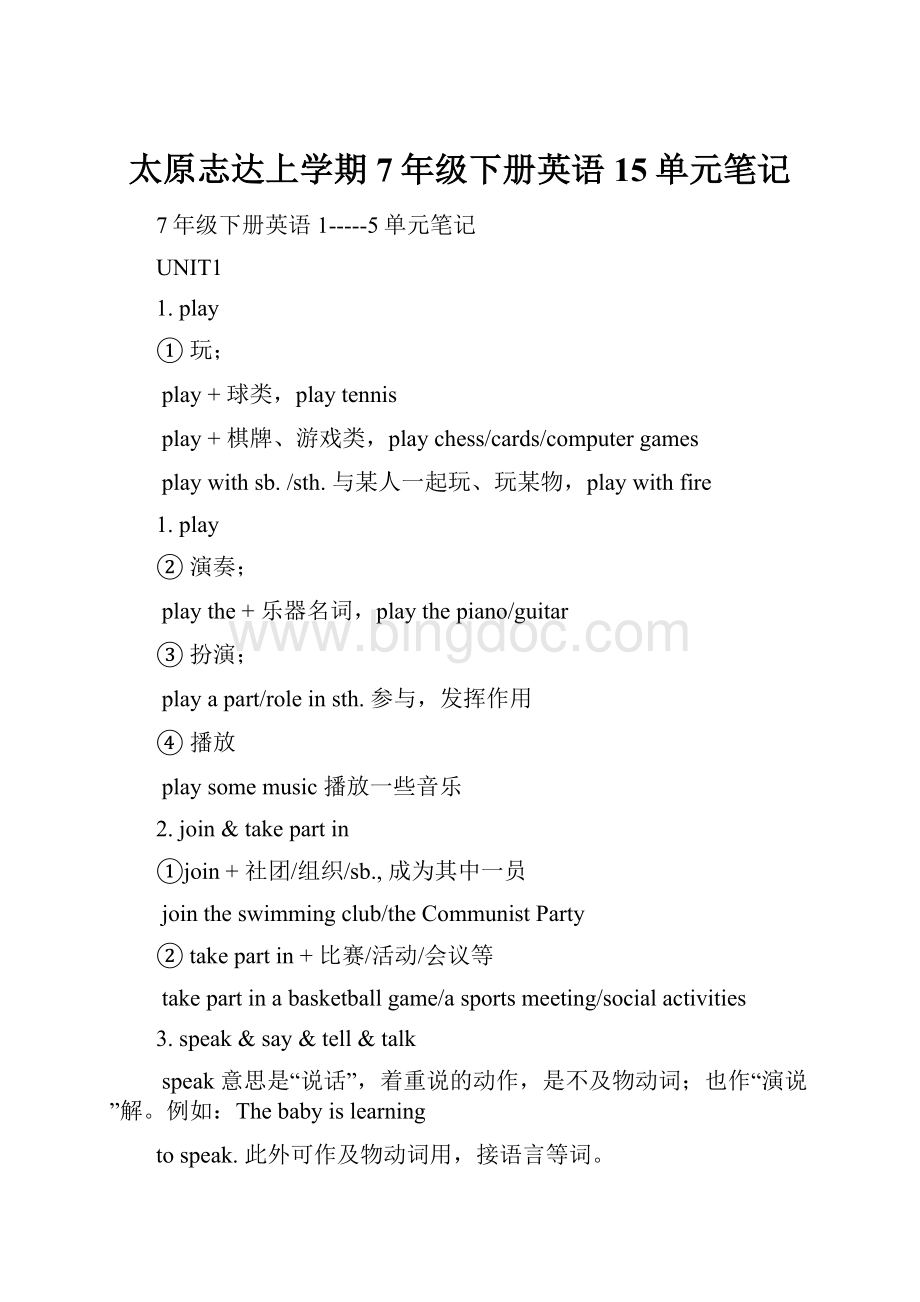太原志达上学期7年级下册英语15单元笔记.docx
《太原志达上学期7年级下册英语15单元笔记.docx》由会员分享,可在线阅读,更多相关《太原志达上学期7年级下册英语15单元笔记.docx(41页珍藏版)》请在冰点文库上搜索。

太原志达上学期7年级下册英语15单元笔记
7年级下册英语1-----5单元笔记
UNIT1
1.play
①玩;
play+球类,playtennis
play+棋牌、游戏类,playchess/cards/computergames
playwithsb./sth.与某人一起玩、玩某物,playwithfire
1.play
②演奏;
playthe+乐器名词,playthepiano/guitar
③扮演;
playapart/roleinsth.参与,发挥作用
④播放
playsomemusic播放一些音乐
2.join&takepartin
①join+社团/组织/sb.,成为其中一员
jointheswimmingclub/theCommunistParty
②takepartin+比赛/活动/会议等
takepartinabasketballgame/asportsmeeting/socialactivities
3.speak&say&tell&talk
speak意思是“说话”,着重说的动作,是不及物动词;也作“演说”解。
例如:
Thebabyislearning
tospeak.此外可作及物动词用,接语言等词。
例如:
DoyouspeakEnglish?
打电话时,习惯用speak,不用talk。
例如:
CanIspeaktoMary,please?
ThisisGinaspeaking.
say意为“说,讲”,侧重表示“说”的内容。
其后可以跟宾语从句。
例如:
IsayIneedhelp.
saysth.tosb.“对某人说某事”
例如:
sayhello/goodbyetoyourteachers
tell意为“告诉”,其后可以跟双宾语,
tellsb.sth.“告诉某人某事”
tellsb.(not)todosth.“告诉某人(不要)做某事”,
例如:
Ourteachertellsusnottobelateforschool.
tell常见搭配:
tellastory/stories/jokes/thenews/alie/thetruth
tell“区别,辨别”tellAfromB把A跟B区分开
tellthedifferencebetweenAandB
talk意为“交谈,谈论”,是不及物动词。
常见搭配:
talkto/withsb.“和某人交谈”
talkaboutsth.“谈论某事”
例如:
Theyoftentalkabouttheweather.
Iwanttotalkwithyourparents.
UNIT2
can的用法
can是情态动词,意思是“能;可
以”,不能独立作谓语,只能与其
他动词(原形)一起构成谓语,且没
有人称和数的变化。
1.表示能力
Ø肯定句:
IcanspeakEnglish.我会讲英语。
Ø否定句:
直接在can后加上not即可。
can与not可缩写成can’t或cannot。
Emmacanplaythepiano.
→Emmacan’t/cannotplaythepiano.
Ø一般疑问句:
把can直接移到主语前即可。
Icanseeacomputeronthetable.
→Canyouseeacomputeronthetable?
Theycansinganddance.
→Cantheysinganddance?
肯定回答用“Yes,主语+can.”;
否定回答用“No,主语+can’t.”。
2.can作为情态动词,可以表示请求或允许。
CanIuseyourpencil?
我可以用一下你的铅笔吗?
Youcansitdown.
你可以坐下。
肯定回答常用OK,sure或certainly等;
否定回答用sorry等。
—CanIborrowyourpen,please?
—Certainly.
—can的过去式为could,常用在疑问句中,表示“请求,许可”,带有强烈的委婉语气的感情色彩,回答常用
—Certainly./Sure./Ofcourse.
—Couldyoupleasetellmeyourname?
—Ofcourse.Helen.
3.can也可以用于推测,表示可能性。
—一般用在否定句中,表示“不可能”。
—Tomisintheclassroom.Hecan’tbehere.汤姆在教室,他不可能在这儿。
—Thismancan'tbeMr.Ruler.这个人不可能是宁老师。
orconj.或,或者
用于选择疑问句,是指说话人提出两种或两种以上的答案,供对方选择。
Isthathatredorblue?
那顶帽子是红的还是蓝的?
Isthataboyoragirl?
那个是男孩还是女孩?
or还有“否则”的意思。
Getupquickly,oryoucan'tcatchthe
earlybus.
提示:
and与or都可用来连接并列的句子成份,但and一般用于肯定句,而or用于否定句。
Ilikeactionmoviesandcomedies.
我喜欢动作片和喜剧。
Shedoesn’tlikesingingordancing.
她不喜欢唱歌和跳舞。
UNIT3
show
v.展示
showsb.sth.=showsth.tosb.给某人展示
某物
showsb.aroundsp.带某人参观某地
eg.Youcanshowyourparentsaroundour
schoolonSchoolDay.
n.表演,展示,演出
schoolshow学校演出
talkshow脱口秀
talentshow才艺演出
flowershow花展
同义词:
display
also、too、either、aswell
also肯定句实义动词前,be动词、助动
词、情态动词后
too肯定句、疑问句句末。
前有逗号
aswell句末,无逗号
either否定句,句末,前有逗号隔开
help
v.帮助
helpsb.(to)dosth.帮某人做某事
helpsb.withsth.在某方面帮助某人
helponeselftosth.随便吃/喝...
can'helpdoingsth.情不自禁做某事
eg.Heoftenhelpsme(to)learnEnglish.
=HeoftenhelpsmewithmyEnglish.
Icouldn'thelpsmilingwhenIheardthejoke.
n.帮助
withthehelpof在…的帮助下
asksb.forhelp向某人寻求帮助
eg.Withthehelpofmymathteacher,
mymathimprovedalot.
Weshouldaskthepoliceforhelpwhen
weareindanger.
need
1.实义动词,“需要”(有人称和数的变化)
need+n./pron.
needtodosth.需要做某事
needsb.todosth.需要某人做某事
eg.
Myfatherneedsmetohelphimwashthecar.
2.情态动词(没有人称和数的变化)
need+动词原形,通常用在否定局或疑问句
中
在MustI/we...开头的一般疑问句中,否定句
回答用No,youneedn't.
eg.—MustIhandinmyhomeworktoday?
—No,youneedn't.Youcanhanditin
tomorrow.
begoodat,begoodfor,begoodto,be
goodwith
•begoodat+n./pron./doing
“擅长(做)某事”
同义词组:
dowellin
反义词组:
beweakin/bepoorat
•begoodfor“对…有益”
反义词组:
bebadfor
•begoodto“对…友好”
=bekind/friendlyto
•begoodwith“和…相处得好;善于应
付…”,后常接人
=getonwellwith...
•makefriends“结交朋友”
makefriendswithsb.
•busyadj.忙碌的
bebusywithsth.
=bebusy(in)doingsth.忙于(做)某事
•English-speakingcountries/students
“讲英语的国家/学生”
spokenEnglish英语口语
•ontheweekend“在周末”
=onweekends
=attheweekend/weekends
•teach“讲授,教”
teachsb.+学科
teachsb.todosth.“教某人做某事”
eg.Mr.Rulerteachesusmath.
teach-teacher“教师”
话题一:
招聘广告
广告标题:
...wantedfor...
招聘原因:
•Weneedhelpto...at/in...
•Weneedyoutohelpwith...for.../help...to...
•Wewantsomestudentsfor...
招聘条件:
•Canyou...or...?
•Areyougoodat...?
•Areyougoodwith...?
•Doyoulike...?
•Doyouhavetime/Areyoubusy(free)
on/in/at...?
联系方式:
•Pleasecall...at...
•Pleaseemail...at...
•Ifyouareinterested,pleasecall/email...at...
•Ifyouwanttobeinour...,youcan
call/email...at...
•Ifyouwanttojoinus,pleasecall/email...at...
话题一:
能力特长
表达意愿:
•Iwanttojoin...
•I'dliketobeamemberof...
描述特长:
•Ican...
•Icannotonly...butalso...
•Ilike(to)...verymuch.
•Iamgoodat/dowellin...
•Iamgoodwith/Icangetonwellwith...
•Ihaveexperiencein...
联系方式:
•Pleasecall/emailmeat...
•Mytelephonenumber/emailaddressis...
Unit2SectionA
时间表达法
整点钟读法:
(点数+o’clock)
nineo’clock
顺读法:
6:
05sixOfive
6:
15sixfifteen
6:
30sixthirty
6:
45sixforty-five
6:
55sixfifty-five
逆读法:
(1)分钟数为30,….点半:
6:
30halfpastsix
5:
30halfpastfive
(2)分钟数不到30,……点过……分:
6:
05fivepastsix
6:
10tenpastsix
6:
15aquarterpastsix
(3)分钟数超过30,差……分……点:
6:
45aquartertoseven
6:
50tentoseven
6:
55fivetoseven
1.getdressed穿上衣服
dressv.给……穿衣服
dresssb./oneselfin+衣物
Couldyoudressthechildforme?
你能替我给小孩穿上衣服吗?
Canthelittleboydresshimselfnow?
这个小男孩现在会自己穿衣服了吗?
dressup盛装打扮;dressupas打扮成
dress和puton的区别
e.g.:
Themangetsdressedandgoesout.
这个男人穿好衣服然后走出去。
It’scoldoutside.Putonyoursweater,Daming.
大明,外面天冷,穿上毛衣。
小结:
dress既可表示动作,又可表示状态,常由人作宾语,意为“给……穿衣服”。
当dress表示状态时,一般要用bedressedin的形式。
如:
Sheisdressedinaredcoat.
她穿着一件红色的上衣。
puton着重于“穿”这一动作,即由没穿到穿这一过程的完成,意为“穿上”。
sb.puton+衣物
2.getup起床
geton上车getoff下车
getin进入,上车getout出去
getback回来getto到达
getdressed穿上衣服getlost迷路
getmarried结婚getdivorced离婚
gettogether相聚,聚会
getready/preparedfor为...做好准备
getalong/on(well)with和...相处(得好)
3.jobn.工作,职业
例如:
Heisoutofjob.
他失业了。
Ihavemanyjobsforyoutodo.
我有很多工作让你做。
词汇补充:
career事业,职业生涯
employment就业
辨析:
work/job
job:
作“工作”解,特指“雇佣性质的工作”,是可数名词。
work:
“工作,劳动”,指一般的工作,是普通名词,且不可数。
当不及物动词时,常与on,with,for等连用。
work当可数名词时,意为“作品”。
Heislookingforworknowandhewantstofindajobsuitableforhim.
他现在正在找工作,并且想找一份适合自己的工作。
4.That’safunnytimeforbreakfast!
那个时间吃早饭真有意思哟!
1)time常常和介词for搭配,表示“做……的时间”。
例如:
Wedon’thavetoomuchtimeforsports.
我们没有太多时间开展体育活动。
Timefordinner,children.Goandwashyourhands,please.
孩子们,饭好了。
请洗手去吧。
2)funnyadj.奇怪的;滑稽好笑的
例如:
Maryisafunnygirl.
玛丽是个有趣的女孩。
Themonkeyshowisveryfunny.
这猴子的表演非常滑稽。
5.Iusuallyexerciseatabouttentwenty.
我通常在10点20分左右锻炼身体。
exercise作动词,意为“锻炼”,可以作为及物动词,也可以作不及物动词。
例句:
Howoftendoyouexercise?
你多久锻炼一次?
Heexerciseshisbodyeveryday.他每天锻炼身体。
exercise还可以作为名词,
1)作不可数名词,意为“锻炼,运动”,
可以和do、take搭配,do/takeexercise意为“做运动,锻炼”
2)作可数名词,意为“(保持健康或培养技能的)一套动作,训练活动,练习”,如:
doeyeexercises做眼保健操
e.g.Hedoes/takesexerciseeveryday.
Wedomorningexerciseseveryday.
6.I'mneverlateforwork.
我上班从不迟到。
lateadj.&adv.晚(的),迟(的)
arrive/belatefor迟到
lately=recently近来,最近
latest最新的latestnews最新消息
反义词:
earlyadj.&adv.早(的)
例句:
Igettoschoolearlytoday.
Theearlybirdcatchestheworm.
早起的鸟儿有虫吃。
Myday1
MynameisAlice.I’mthirteen.I’mastudent.
Igetupatsixeverymorning.
ThenIbrushmyteethandtakeashower.
Ieatbreakfastatsixthirty.
Afterbreakfast,Igotoschool.
Igettoschoolataboutseven.ThenIreadEnglishorChinese.
Ihavethefirstclassateightten.Ihavefourclassesinthemorning.
Ieatlunchattheschool.Afterschool,
Iplaysportswithmyfriends.
ThenIgohome.Igethomeataboutfourtwenty.
Idomyhomeworkatfive.
ThenIeatdinnerwithmyparents.
Afterdinner,IcanwatchTVforanhour.
Iusuallygotobedatnineten.
Myday2
TodayisSunday.Igetupearly.
BecauseIgototheplaygroundtoplay
ping-pongwithLucy.Afterthat,weeat
breakfast.Ilikedrinkingmilkbutshe
likesdrinkingjuice.At10:
00,Iplaythe
piano.ThenIhavelunchat1:
30.ThenI
gotoschoolandstudyEnglish.Afterthat,
Igohomeandeatdinner.ThenIgoto
bedbefore9:
30p.m.
Thisismyday.Doyoulikeit?
Unit2SectionB
1.Intheevening,IeitherwatchTVorplaycomputergames.
晚上,我要么看电视,要么玩电脑游戏。
either:
1.adv.“也(不)”,否定句句末,逗号隔开。
2.pron.“(两者中)任一”
3.conj.常用于“either…or…”结构中,
意为“要么…要么…,或者…或者…”。
此结构作主语时,谓语动词遵循“就近原则”。
例句:
Peterdoesn'tlikeplayingsoccer.Idon'tlikeit,either.
彼得不喜欢踢足球。
我也不喜欢。
Thetwobooksareveryinteresting.Youcanbuyeitherofthem.
这两本很有趣。
你可以买其中任何一本。
Youcanplayeitherbasketballorsoccer.
你要么打篮球要么踢足球。
EitheryouorIamright.
要么你是对的,要么我是对的。
both,all,either,neithernone
both意为“两者都”。
both...and...意为“…和…(两者)都”
all意为“三者或三者以上的人或物都”
either意为“两者中的任何一个”。
either...or...意为“或者…或者…,要么…要么…”,作主语时,谓语就近原则。
neither意为“两者都不”,是both的反义词。
neither...nor...意为“…和…(两者)都不”,作主语时,谓语就近原则。
none意为“三者或三者以上的人或物都不”,是all的反义词。
例句:
BothmyfatherandIareathome.
我和我爸爸都在家。
AllofmyclassmatesarefromNanjing.
我所有的同学都来自南京。
EitheryouorLilyhastostayathome.
或者你或者莉莉必须呆在家里。
NeithermyfathernorIaminterestedinyourstory.
我和我爸爸都对你的故事不感兴趣。
2.Sheknowsit'snotgoodforher,butittastesgood!
她知道那对她不好,但它太好吃了!
taste:
感官动词,意为“尝起来”。
本句中good是形容词,作taste的表语。
例如: